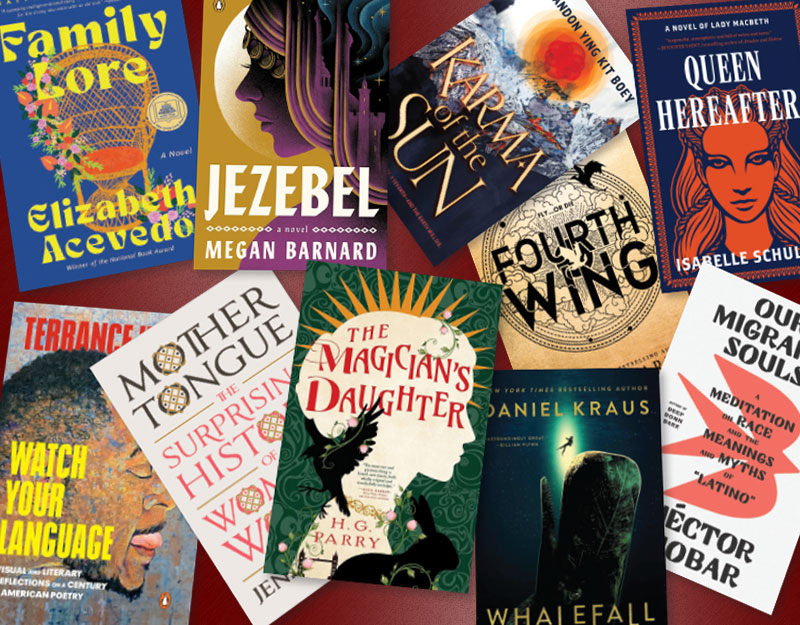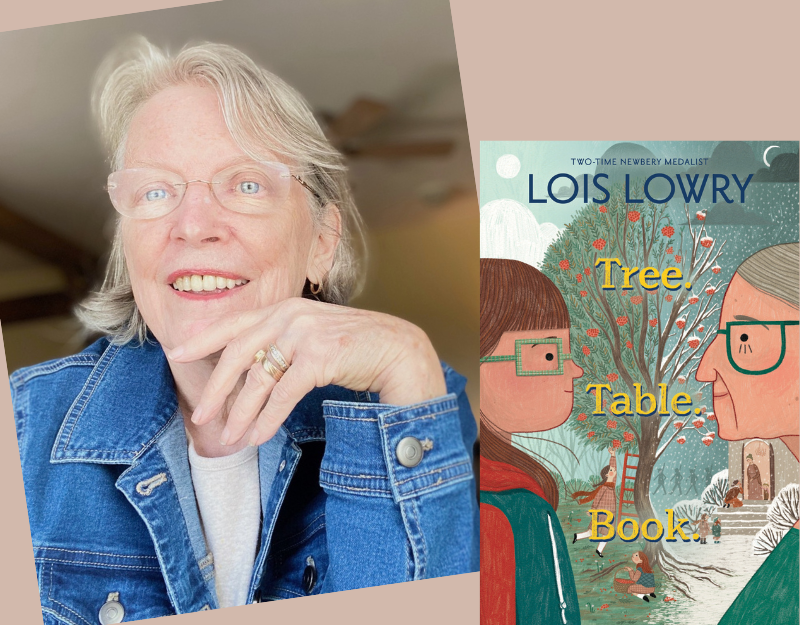SCROLL DOWN TO READ THE POST
What a Treat: Guest Reviews
Back in November, we asked if any of our readers wanted to toss a “nomination” or two into the ring. Well, we have three! We are lucky to have wonderful readers and commenters, and even luckier to have three of them plugging their favorite books. Each review considers the book in light of its Printz chances; read on to see if you agree, disagree, or have some insights to add!
 The Language of Thorns: Midnight Tales and Dangerous Magic, Leigh Bardugo, illustrated by Sara Kipin
The Language of Thorns: Midnight Tales and Dangerous Magic, Leigh Bardugo, illustrated by Sara Kipin
Imprint (Macmillan), September 2017
3 stars; reviewed by Meredith Burton
Fairy tales were always intended to reveal life’s cruelties and wonders. The truest fairy tales contain bitter darkness seasoned with light: the light of sacrifice and empowerment. The Language of Thorns is a collection of fairy tales in the truest sense. Predators hide in plain sight, and those who are considered weak prove to be strong. Not every story ends happily, but the protagonists make momentous decisions as they poise on the precarious brink between adolescence and adulthood.
ADVERTISEMENT
ADVERTISEMENT
Bardugo’s characters are not conventional fairy tale types. In “Ayama and the Thorn Wood,” the heroic character is not the beautiful sister but the girl that no one regards. In “Little Knife,” the traditional theme of a suitor completing three tasks to win a beautiful bride is criticized through the inclusion of two female characters who appear submissive but are more than they seem. The theme of molestation is explored in “The Witch of Duva,” a story with echoes of “Hansel and Gretel.” The stepmother may not be the real monster.
Bardugo uses fairy tale motifs to introduce characters who find their voices through adversity. Ayama’s honest storytelling helps her appease an imprisoned beast. Nadya uses her skills as a baker to unmask the true villain in her village. A mermaid’s song reshapes a kingdom. A nutcracker breaks free from the role he was intended to play. These characters discover ways to shape their own destinies.
The Language of Thorns exhibits a wide array of settings: an undersea flower garden created through song, a winter forest with luscious scents, and an urban setting with clockwork wonders. Bardugo paints evocative word pictures that are immersive and unique. “That night she swam to the wreck of the Djenaller, a ship brought low only months before, a warning to the men of the land to keep from their waters. She pulled scraps of cloth and pearl from the skeletons in its cabins, and over those ragged leavings she sang a song of making. She barely knew what mortal gowns should look like, but she drew seed pearl and lost silk together and made three dresses that pleased her.” (“When Water Sang Fire”).
I am a blind individual and cannot comment on the anthology’s illustrations, but I have been told that they unfurl along the borders of each page, culminating in double spreads at the end of the stories. Sara Kipin’s illustrations add depth to Bardugo’s words.
In The Language of Thorns, fairy tales are gutted and refashioned into gems of truth. Bardugo defies genre conventions and gives us a detailed world with characters who refuse to be defined by their traditional roles. This anthology should not be overlooked.
Meredith Leigh Burton is a motivational speaker, middle school English teacher, aspiring author, and voracious devourer of fairy tales. She volunteers at Lanum Public Library in Tullahoma, Tennessee. Her favorite activity is reading to young children in schools and educating them about Braille.
 An Uninterrupted View of the Sky, Melanie Crowder
An Uninterrupted View of the Sky, Melanie Crowder
Philomel, June 2017
3 stars; reviewed by Anne Bennett
When Francisco’s father is arrested for a seemingly innocent action of carrying a can of gasoline to feed into his taxi, everything in the family is thrown into tumult. At that time in Bolivia, the poorest country in South America, politicians tried to appease the United States and our war on drugs by arresting anyone suspected of anything related to drugs using law #1008. People in the lower classes, who could not afford a lawyer, would languish in over-crowded prisons without so much as a court case or any hope of ever getting out. If the family had no other form of support, they would be forced to move into the prison, as well. Francisco and his younger sister are forced to do just that. The title, The Uninterrupted View of the Sky, suggests that wrongful imprisonment keeps the family from enjoying the simplest of freedoms—a view of the sky.
Suddenly Francisco must grow up fast. If Francisco is ever going to help his family he must go to university and study law. In the meantime, he must also get his sister to safety with his father’s family upcountry. Poetry becomes a tool for expressing feelings and communicating across cultural and generational divides.
I became aware of Melanie Crowder after reading her astonishingly good book, Audacity, about the Triangle Shirt Waist fire and the rights of workers in the clothing industry in this country in the early part of the twentieth century. That book was written in verse. The Uninterrupted View of the Sky, though not written in verse, does include a lot of poetry which is really well done and advances the story and the understanding. Crowder said she wrote this book in response to a personal situation. In the 1990s she spent some time in Bolivia and she first-hand the corrupt justice system and the forced imprisonment of people too poor to pay for legal help, all done to satisfy the US war on drugs and Law 1008.
This YA book has heart. It is a demanding and jarring story presently gently, with a touch of poetry, so the reader doesn’t end up feeling clubbed over the head with the information.
If this book has a chance at the Printz table it will be because of its poetry. Crowder uses her gift with poetry well in this historical/multicultural novel. Her writing is just gorgeous. It is very easy to get caught up in the beauty of her words even though they are describing horrifying life conditions. If the book is left out of the Printz discussion it may be because the lack of full character development of all but the main protagonist, Francisco, who does show growth and depth of understanding throughout the book. All other characters remain a bit flat or static. But that said, I love the book so much, I do hope it is given Printz consideration or at least an invitation to the table.
Anne Bennett is a recently retired high school librarian. She hosted a Mock Printz workshop at her school for several years and recently participated as a Round 1 Judge for High School/Junior High Nonfiction for the Cybils Award. She blogs at https://headfullofbooks.blogspot.com.
 The Inexplicable Logic of My Life, Benjamin Alire Sáenz
The Inexplicable Logic of My Life, Benjamin Alire Sáenz
Clarion, March 2017
3 stars; reviewed by Kate Browne
The Inexplicable Logic of My Life isn’t particularly flashy or high-concept; I can’t describe it in a one-sentence “this was the one where __________.” And it’s too long, probably. Then again, so are those last years of high school, when you can’t start your adult life soon enough, but you feel like you’re running out of time to figure out the origin story you’re going to tell for the next decade.
For me, the delineation of characters was exceptional: I loved each of Sal, Sam, and Fito, and I understood who they were. Sal, in particular, navigates a heartwrenching inversion of the classic “my REAL parents would understand me” trope, fearing instead that his genetic history will overwhelm his loving father’s care at any time. We also see Sal’s father, Vicente, fleshed out as a human being with desires and feelings, not just A Dad, but always also a dad.
ADVERTISEMENT
ADVERTISEMENT
The plot sometimes feels like it rests on coincidence: there’s always a spare room available, literally or metaphorically, when someone needs a place to go. I’d argue, though, that sometimes that’s how loving families and communities are. A light is always on for you somewhere.
Sáenz is a poet as well as a novelist, which I felt in the book’s voice. Is Sal a poetic enough kid to be narrating this book? (I’d argue yes, obviously.) On voice, on theme, on style, on characters: if I were coming to discuss this book, I’d have a sticky note on the “Cemetery” chapter on p. 420. I’d be ready to read the increasingly frantic, grief-stricken sentences that begin “I still see…”, to end on “I wasn’t an adult. I wasn’t a man. But I wasn’t a boy anymore.”
But I’d also want to throw in the beginning of the next chapter, as the stately, purposeful grief of the funeral passes and the emotional comedown begins: “After the funeral, there was a reception. Lots of people. People, people, people. If I heard one more very nice person say, This is your son, Vicente? God, he’s handsome, I was going to fucking scream.”
The 2013 ALA awards committees lauded Benjamin Alire Sáenz for his fourth young adult novel, Aristotle and Dante Discover the Secrets of the Universe, which was recognized by the Printz, Stonewall, and Pura Belpré committees as well as the Lambda Literary Awards. It would be (wait for it) inexplicable if the RealCommittee weren’t giving this one a close read.
Kate Browne, better known at Someday as Kate B., is the Youth Services Librarian at the University of Northern Iowa. She can be found on Twitter at @brownekr.
Filed under: Contenders, Fiction, Guest Posts
About Karyn Silverman
Karyn Silverman is the High School Librarian and Educational Technology Department Chair at LREI, Little Red School House & Elisabeth Irwin High School (say that ten times fast!). Karyn has served on YALSA’s Quick Picks and Best Books committees and was a member of the 2009 Printz committee. She has reviewed for Kirkus and School Library Journal. She has a lot of opinions about almost everything, as long as all the things are books. Said opinions do not reflect the attitudes or opinions of SLJ, LREI, YALSA or any other institutions with which she is affiliated. Find her on Twitter @InfoWitch or e-mail her at karynsilverman at gmail dot com.
ADVERTISEMENT
SLJ Blog Network
Name That LEGO Book Cover! (#53)
Cover Reveal and Q&A: The One and Only Googoosh with Azadeh Westergaard
Exclusive: Vol. 2 of The Weirn Books Is Coming in October | News
Take Five: Middle Grade Anthologies and Short Story Collections
The Classroom Bookshelf is Moving
ADVERTISEMENT
ADVERTISEMENT







